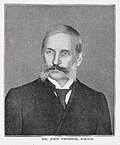File:Li Hongzhang.jpg

原始文件 (1,077 × 1,537像素,文件大小:574 KB,MIME类型:image/jpeg)
摘要
| 描述Li Hongzhang.jpg |
English: John Thomson: Li-hung-chang (see No. 3), the second of five sons, was born two years after the accession of the Emperor Tau-kwang, in the province of Ngan-whui. His father was an obscure literary man, who, notwithstanding poor circumstances, yet managed to give his children a liberal education. Young Li, the subject of these notes, succeeded in passing the different degrees at the Government examinations, and in 1848, being then twenty-six years of age, became a member of the Han-lin College. When the rebels invaded his native province he raised a local regiment, and placed himself and his troops at the disposal of the Viceroy of the two Kiang. Li joined Tseng-quo-fan, under whom he was advanced to the rank of Taotai, and subsequently to the command of a division of Tseng's Grand Army in Chch-kiang.
In 1861, the first year of the Emperor Tung-che, he was recommended by Tseng-quo-fan to be acting-Footai of Kiangsu, and then, by the aid of Colonel Gordon, with his Ever-victorious Army, he cleared the province of rebels. On the fall of Soochow he (it is said, but opinion is divided on the subject) ordered all the rebel wangs (Kings) to be beheaded, in defiance of his guarantee that their lives should be spared; the condition on which the city was given up. I have been informed by an officer, who was present at the time, that the massacre of Soochow was not an act of treachery on the part of Li, the order came from another and a higher quarter. Li-hung-chang was, however, greatly incensed, when, the day after the capitulation, the rebel kings visited him wearing their rebel robes, and the long hair which was a badge of rebellion. He must have assented to the massacre, and the central government approved the bloody and treacherous deed, and confirmed Li-hung-chang in the office of Footai. In addition to this the Emperor conferred on him the "Yellow Jacket," one of the highest rewards bestowed in China for eminent military services, and also gave him the title of Fai-tsze-shaou-paon, or Inner Guardian of the Throne. Li-hung-chang .now removed to Soochow, and as the rebels had destroyed the residence of the former Footai there, established himself in the palace of the " Chung Wang " (or " Faithful King "), a splendid edifice which had been erected by this rebel chief. Here he remained till Nanking had fallen in 1864, and he was then ordered to proceed to that city as Viceroy of the Two Kiang. He was at the same time created a noble of the third class, and decorated with the double-eyed peacock's feather for conspicuous services. In 1866, Tseng-quo-fan and Li-hung-chang changed places, the latter proceeding against the Neinfei rebels, whom he succeeded in clearing from the north. In 1867 he was appointed Viceroy of Hupeh and Hunan, and from there he was dispatched with an army against the Mahometan rebels, who for some years back had set up the standard of revolt in the western provinces of the Empire. After the Tientsin massacre, Li was replaced by his elder brother in the government of Hupeh and Hunan, and appointed Viceroy of Peichihli. His proper title is now Li-chang-tang, for he was raised to the rank of a second noble about three years ago. He is now the greatest son of Han, and in appearance the finest specimen of his race which it has been my lot to come across. He stands six feet high, his bearing is erect and noble, and his complexion exceedingly fair, while dark, penetrating eyes, and a mouth shaded by a dark brown moustache, betoken inflexible determination. At the risk of being deemed impertinent, I may add, for the information of readers who have not had the good fortune to come in contact with educated Chinese, that Li-hung-chang possesses the cultivated polish and graceful courtesy which are invariably the attributes of a gentleman. But these, indeed, are qualities he shares in common with all mandarins of rank. Although thoroughly Chinese by sympathy and education, Li-hung-chang has an intense admiration for our sciences, and for the inventive faculties displayed by the races of the West. He is also ever ready to admit the superiority of our arts and appliances, and eager to advocate their practical introduction into China. |
||||||||||||||||||||
| 日期 |
约1860年 date QS:P,+1860-00-00T00:00:00Z/9,P1480,Q5727902 |
||||||||||||||||||||
| 来源 | Beinecke Rare Book & Manuscript Library | ||||||||||||||||||||
| 作者 |
creator QS:P170,Q736862 |
||||||||||||||||||||
许可协议
| Public domainPublic domainfalsefalse |
|
本作品在其来源国以及其他著作权期限是作者逝世后70年或以下的国家和地区属于公有领域。
| |
| 本文件已被确认为免除已知的著作权法限制(包括所有相关权利)。 | |
https://creativecommons.org/publicdomain/mark/1.0/PDMCreative Commons Public Domain Mark 1.0falsefalse
文件历史
点击某个日期/时间查看对应时刻的文件。
| 日期/时间 | 缩略图 | 大小 | 用户 | 备注 | |
|---|---|---|---|---|---|
| 当前 | 2014年1月25日 (六) 07:02 |  | 1,077 × 1,537(574 KB) | 維基小霸王 | bigger |
| 2010年12月3日 (五) 22:45 |  | 282 × 351(45 KB) | Uploadalt | {{Information |Description={{en|1=Li_Hongzhang, circa 1860}} |Source=Historica, Yamakawa Shuppa |Author=Anonymous |Date=circa 1860 |Permission= |other_versions= }} Category:Li Hongzhang |
文件用途
没有页面链接到本图像。
全域文件用途
以下其他wiki使用此文件:
- en.wikisource.org上的用途
- es.wikipedia.org上的用途
- hu.wikipedia.org上的用途
- ja.wikipedia.org上的用途
- ko.wikipedia.org上的用途
- ru.wikipedia.org上的用途
元数据
此文件中包含有扩展的信息。这些信息可能是由数码相机或扫描仪在创建或数字化过程中所添加。
如果此文件的源文件已经被修改,一些信息在修改后的文件中将不能完全反映出来。
| 宽度 | 4,024 px |
|---|---|
| 高度 | 5,663 px |
| 每部件位数 |
|
| 像素构成 | RGB |
| 方位 | 标准 |
| 像素数 | 3 |
| 水平分辨率 | 72 dpi |
| 垂直分辨率 | 72 dpi |
| 使用软件 | Adobe Photoshop CS6 (Windows) |
| 文件修改日期时间 | 2014年1月24日 (五) 13:38 |
| Exif版本 | 2.21 |
| 色彩空间 | 无标定 |
| 原始文件唯一ID | EDA418C00CAD089726787AF6748573FE |
| 数字化日期时间 | 2014年1月18日 (六) 18:46 |
| 原始数据最后修改日期 | 2014年1月24日 (五) 21:38 |
| IIM 版本 | 5,823 |


